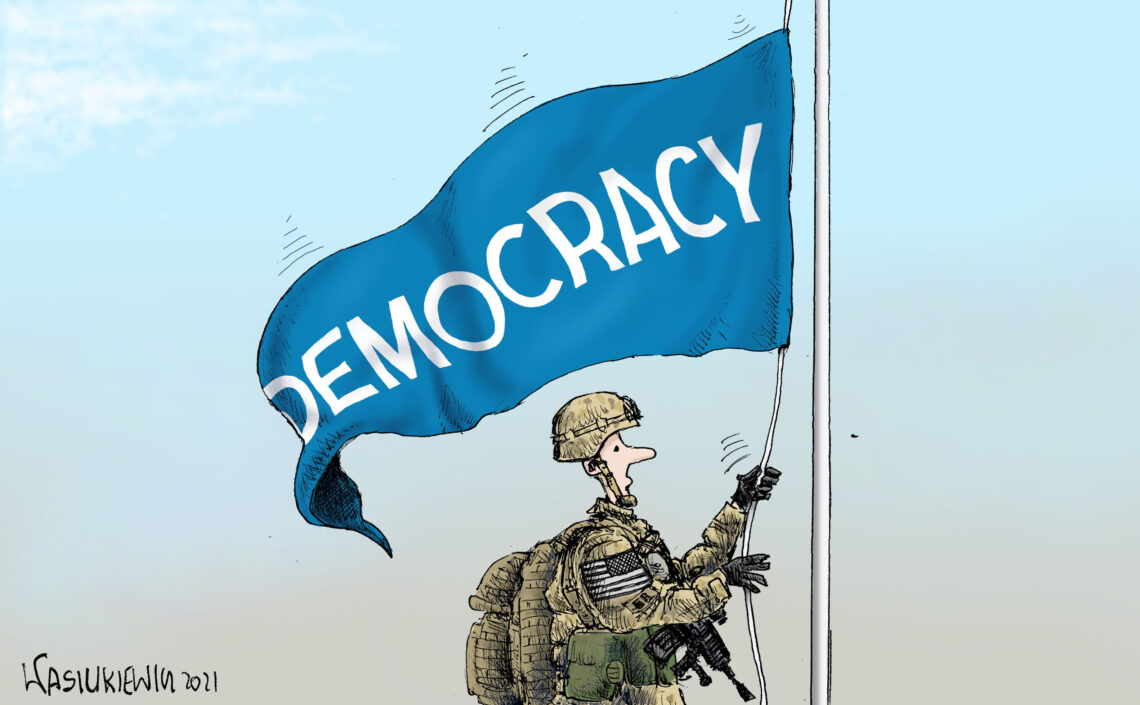The end of the rules-based world order
The long U.S. intervention in Afghanistan is coming to an end. Far from having succeeded at creating a Western-style democratic system, Washington has demonstrated that attempts at imposing values are seldom successful.

Washington decided to discontinue its military presence in Afghanistan, handing back power to the Taliban after a 20-year intervention. This strange experiment, aiming to create a state based on Western conceptions of “robust” central institutions and pipe dreams of national democracy, has failed miserably.
The dream to “make the world a better place” by introducing so-called Western values – a secular gospel of democracy, institutions (and bureaucracy), as well as various undifferentiated rules combined with a neglect of healthy traditional values – has turned out to be an illusion in many places. It is slowly becoming apparent that the “Westernization” of the world will not succeed on this basis.
The world could soon become more fragmented.
Leaving Afghanistan amounts to admitting that Francis Fukuyama’s “end of history” will not take place. After the implosion of the Soviet Union, the American political scientist published an optimistic book declaring that the entire world will soon be democratic, peaceful and free – in other words, the end of history. Meanwhile, both Washington and European countries are worried about who will control the airport in Kabul. The hope is that NATO’s second-largest power, Turkey, will take responsibility for it.
End of morals-driven foreign policy
In a GIS report on Central Asia, Professor Stefan Hedlund writes:
“In recent years, certain nations have begun presenting their culture as an alternative to Western “universal values” and rule-based global order. These “civilizational states,” like China and Russia, have developed narratives that depict their values as fundamentally different from, and superior to, that of the West. India’s Hindu nationalism follows the same approach. The trend could signal the end of foreign and security policies driven by Western ideals. Soon, promoting democracy in faraway lands could go from being merely ineffectual to exacerbating civilizational conflict.” In contrast to his predecessor’s “America First” ideology, United States President Joe Biden has been repeating that “America is back” and intends to revive and strengthen old alliances in Europe and Asia.
Feelings of moral superiority will lead nowhere.
Many believe that the administration of Donald Trump disrupted the rules-based world order, and that the Biden presidency will reinstate it. However, “America is back” rather refers to a traditional coalition of so-called “liberal democracies” than a renaissance of the rules-based system. This was confirmed at the last meeting of the G7, a group comprising seven of the largest industrialized countries (the U.S., Canada, Japan, the United Kingdom, France, Germany and Italy). The organization has decided to finance an initiative to counter China’s Belt and Road infrastructure.
In the text mentioned above, Professor Hedlund adds:
“Beyond the need to repair old relations, the main challenge that awaits the Biden administration is whether it has what it takes to engage with those it sees as foes. Former Secretary of State Mike Pompeo said: “I don’t think the American people can afford to go back to eight more years of Barack Obama’s foreign policy.” Beyond the apparent spite, the former U.S. diplomacy head touched on a raw nerve, suggesting that the core of the challenge is not to undo what took place during the Trump presidency. Instead, it will be to overcome the legacy of the Obama administration – eight years of incoherent morals-driven foreign policy stratagems that resulted in one mess after another, from Russia and Ukraine to Libya and Syria. From that angle, the task appears formidable.”
The end of the American presence in Afghanistan signals the decline of aspirations to build a democratic world order based on Western standards.
The world could soon become more fragmented. This poses challenges and requires new ways of thinking. Europe will have to become more adept at understanding its neighbors in this new political environment. Both Russia and Turkey are making their own choices. Turkey is in a delicate position resulting from its proximity to Europe, the Balkans, the Middle East, the Black Sea and the Caucasus. In many areas, its interests clash with those of Russia. Brussels and European countries should show more subtlety and understanding in their dealings with Ankara, especially when it comes to economic zones in the Eastern Mediterranean, instead of opting for its usual aggressive criticism. Similarly, Russia has to manage relations with both Europe and East Asia, especially China, and protect its southern border.
In this context, feelings of moral superiority will lead nowhere. The new reality will require realpolitik, while not forgetting oppressed ethnic minorities.
